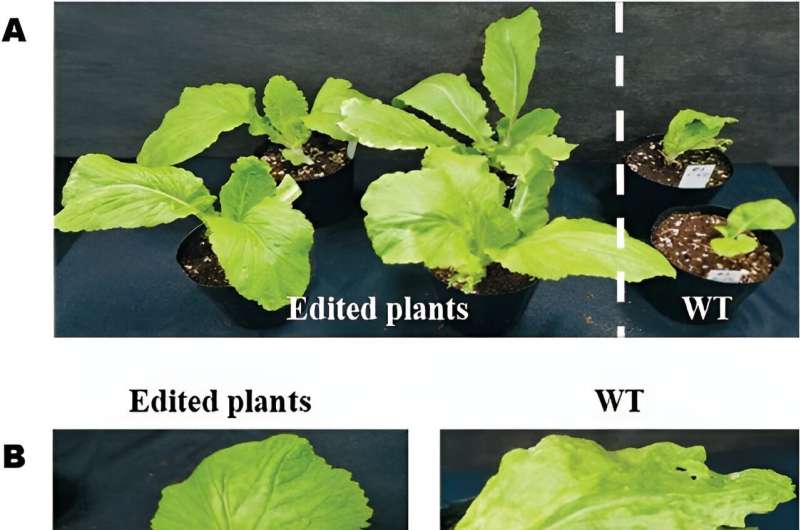This article has been reviewed according to Science X's editorial process and policies. Editors have highlighted the following attributes while ensuring the content's credibility:
fact-checked
peer-reviewed publication
trusted source
proofread
CRISPR/Cas9 unlocks TuMV resistance in Chinese cabbage: A leap forward in genome-edited plant breeding

Genome editing, especially the CRISPR/Cas9 technology, holds immense promise in enhancing plant traits, primarily disease resistance, offering a more efficient alternative to traditional breeding.
The turnip mosaic virus (TuMV), a type of potyvirus, severely threatens Chinese cabbage (Brassica rapa) crops. Existing research suggests that the eukaryotic translation initiation factor (eIF) genes, such as eIF(iso)4E, play a pivotal role in TuMV resistance in Arabidopsis.
It was proposed that the eIF(iso)4E gene, which has been reported to be tightly associated with the Brassica recessive resistance genes, could be a suitable target for the genome editing of TuMV resistance in Brassica species. Given the demonstrated success of CRISPR/Cas9 in creating resistance against various viruses by editing eIFgenes in different plants, the potential for targeting the eIF(iso)4E gene to develop TuMV-resistant Brassica species stands as a compelling avenue for further research.
In April 2023, Horticulture Research published a research paper entitled "CRISPR/Cas9-mediated gene editing to confer turnip mosaic virus (TuMV) resistance in Chinese cabbage (Brassica rapa)."
In this study, researchers employed the CRISPR/Cas9 genome editing technique on the Chinese cabbage, specifically the B. rapa cultivar "Seoul," with the goal of developing plants resistant to the turnip mosaic virus (TuMV). This was accomplished by inserting the CRISPR/Cas9 constructs into the cabbage, followed by shoot culturing, root formation, and PCR analysis.
Of the plants regenerated, 86.7% displayed the desired Cas9 transgenes. However, only one of the three sgRNAs targeting three eIF(iso)4E genes showed significant editing efficiency. Among the genes associated with eIF(iso)4E, only the Bra035393 showcased successful correction.
Deep sequencing further confirmed high gene editing efficiency in four specific T0 edited plants. Upon progression to T1 generation, various new indel patterns were observed, categorized into single, double, and mosaic patterns, and it was confirmed that the eIF(iso)4E-edited mutant plants were resistant to TuMV.
When inoculated with TuMV, wild-type plants displayed clear virus symptoms within a week, while the edited plants, particularly those with high indel frequency, exhibited resistance. This resistance was quantified by analyzing the amounts of the virus coat protein accumulation.
A stark negative correlation was found between indel frequency and virus presence, solidifying the role of eIF(iso)4E in TuMV resistance.
Phenotypically, the edited plants, even those with minor TuMV symptoms, showed healthy growth and development 30 days post-inoculation, unlike the wild-type counterparts that exhibited mosaic symptoms characteristic of TuMV, stunting their growth.
Further resistance assessment in a controlled environment reinforced these observations, with edited plants, especially those with a high indel frequency, showing no discernible difference from non-inoculated plants. In contrast, many wild-type plants either died or displayed severe growth issues.
In summary, this study underscores the potential of CRISPR/Cas9 in expediting the breeding process to enhance desired traits in crops, offering a comprehensive protocol for refining targeted attributes in Chinese cabbage through genome editing.
More information: Ye-Rin Lee et al, CRISPR/Cas9-mediated gene editing to confer turnip mosaic virus (TuMV) resistance in Chinese cabbage (Brassica rapa), Horticulture Research (2023). DOI: 10.1093/hr/uhad078
Journal information: Horticulture Research
Provided by NanJing Agricultural University




















